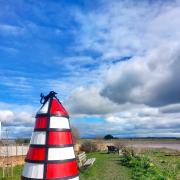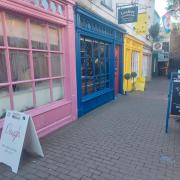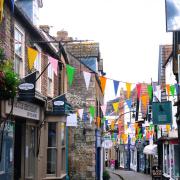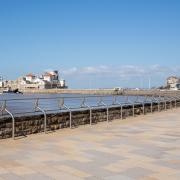We all have an impact on the environment. Is carbon offsetting the answer or should we be doing more to lead a greener lifestyle? If you are what government statistics describe as 'the average person', then you are responsible for producing about ...
But it's not possible for any of us to eliminate our carbon footprint entirely, and today an increasing number of green-thinking businesses and individuals are turning to carbon offsetting. Put simply this means calculating the amount of CO2 you produce and then paying for projects that absorb or reduce the same amount of greenhouse gases.
One such example is tree planting in forests in the UK, including 35 acres on the Devon/Somerset border owned by a carbon offset company based near Taunton. co2balance.com was set up nearly five years ago, and what started out as a pioneering back-bedroom hobby for Mark Simpson and Mike Rigby has grown into a 19-strong team based on the High Street in Bishops Lydeard .
"We are the only carbon-offset company that runs and manages all of our projects ourselves, that way we can be certain that the benefits promised will actually be delivered," explains Gary Rumbold.
"We have a series of forests in the UK - in Devon, Cornwall and Cumbria - and we are in the process of reforesting disused agricultural land at Hemyock on the Blackdown Hills. Our aim is to capture carbon and create a new biodiverse environment, which will encourage different wildlife into the area."
Clients' funds are also invested in other projects such as a solar lantern scheme based in East Africa. "A large proportion of the rural community relies on old kerosene lamps," says Gary. "We have created a micro-business where we have trained the staff and provided them with the materials they need to convert the lanterns to LED lights.
"They have a solar element and are charged during the day and burn at night for about three to five hours. In addition to the carbon saving, you also lose the fire risk and respiratory problems associated with burning kerosene in enclosed spaces. The lights also allow more study time for students, which has been a great unexpected spin-off." Co2balance also runs schemes for solar ovens and biogas entrapment in the region.
co2balance - whose local clients include BBC Somerset (the first carbon-rated radio station in the UK) and Andrews Estate Agents (Bristol) - appreciates that carbon offsetting is not the complete answer to global climate change. But the company believes that until new technologies are introduced and people's behaviours are altered, then it has a part to play.
"In 15 years' time we believe we will be a different sort of organisation; carbon offsetting will not be our main business. In this transition period wealthy businesses can provide financial support to the developing world to help new technologies be as efficient as possible through carbon-offsetting projects. This is where carbon offsetting has an exciting and progressive part to play in the fight against climate change," says Gary.
Wedmore Green Group puts 100% of the money towards local environmental projects such as a community woodland planted with 250 native trees
Bristol International Airport, which submits a planning application for expansion this year, is the UK's fifth largest regional airport; around six million passengers flew to more than 100 destinations in 2007.
The impact of flights from Bristol International Airport in 2005 equated to 0.06% of the UK's greenhouse gas emissions, but the airport is not sitting on its laurels. The Sustainable Aviation Strategy, to which Bristol International Airport is a signatory, includes targets to improve the fuel efficiency of aircraft by 50% by 2020. And the airport has linked up with carbon-offset company ClimateCare to offer passengers the opportunity to offset the greenhouse gas emissions of their flights. These might include investing in wind turbines in India, providing cooking stoves for Mexico or restoring rainforests in Uganda.
Meanwhile, EasyJet, which operates flights to 30 destinations from Bristol, has become the first major European airline to offer its customers the chance to offset the carbon emissions of their flights by investing exclusively in United Nations-certified projects such as the Perlabi Hydroelectic Project in Ecuador.
Calculating your emissions when you take a flight is an interesting exercise. That summer holiday to Spain will produce 0.33 tonnes of CO2 per person, and the cost to offset it will be £2.49. Flying the 21,303-mile return journey from Bristol to Sydney will create 5.67 tonnes, and will set you back £42.56 to salve your conscience.
But it's not as easy as that, says Steve Mewes who is a founder of the Green Group in the village of Wedmore. He believes we should not use offsetting as a conscience-saver but as a last resort if we have to fly.
"Wealthy businesses can provide financial support to the developing world to help new technologies be as efficient as possible through carbon-offsetting projects"
Steve has measured his annual carbon footprint at nearly 5 tonnes, and one flight to visit friends in South Africa would almost double that figure. Rather than rule out flying altogether, he chooses to do so very rarely, on special occasions, and offset the CO2 he uses. But the money that he would have given to an offset company in the past he now pays to the Green Group, which puts 100% of the money towards local environmental projects such as a community woodland planted with 250 native trees.
Wedmore Green Group also campaigns to improve recycling provision in the area, works with local schools to encourage children to think about environmental issues and gives advice to householders looking to invest in renewable energy schemes such as wind turbines.
"Our main focus is helping people who see the information in the media but don't know what to do. We are conscious of the timescale and urgency. We never want to be a talking shop, but focus on getting on with things while having fun!
"We try to remind people that the worse excesses of climate change are not being felt in the UK but in the Pacific Islands, Bangladesh or Africa where people will be suffering the most. If we still continue to fly and drive as we have always done, the increases in CO2 will still be in the atmosphere, even though some of it is offset.
"Ideally we should reduce what we are doing. People see environmental issues negatively but there are so many positives as well. If we walk or cycle we get healthier and if there are less cars on the road then there is less pollution and less noise. If we can reduce our carbon footprint locally and globally it will be a much better life." BY SARAH FORD
What is your view on carbon offsetting? Discuss with other readers on the Forum.


























